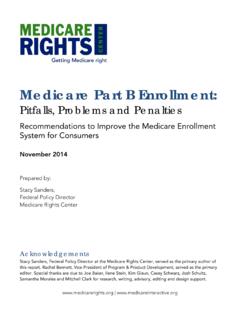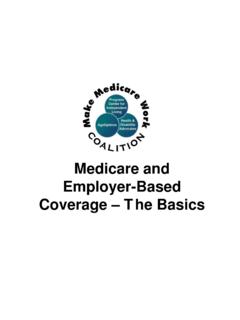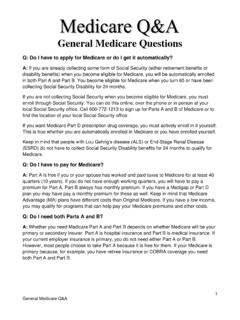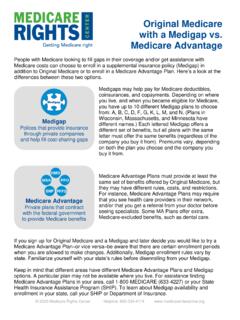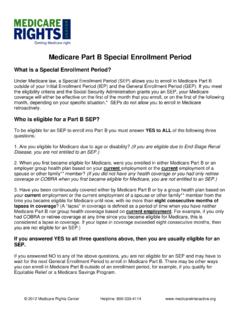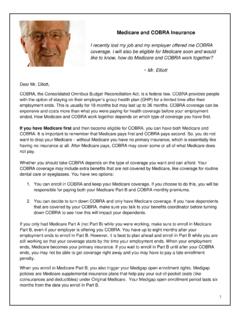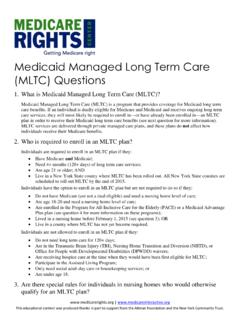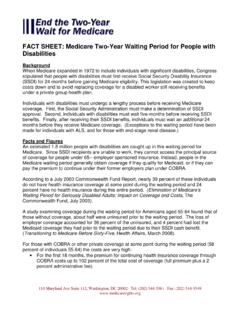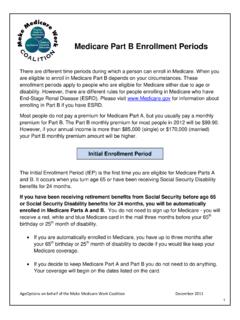Transcription of The Bipartisan Budget Act of 2018: Key Provisions …
1 2018 Medicare Rights Center. All Rights Reserved. The Bipartisan Budget Act of 2018: Key Provisions and Policies for People with Medicare On February 9, Congress passed and the President signed a sweeping spending bill that will fund the government through March 23 and raise the spending caps imposed by the Budget Control Act of 2011 for two years, paving the way for a longer-term spending agreement. The legislation the Bipartisan Budget Act of 2018 ( 115-123, BBA of 2018) also suspends the government s cap on borrowing through March 2019, and contains a number of health care Provisions important to people with Medicare and their families. Below, please find the Medicare Rights Center s preliminary analysis of the BBA of 2018, which focuses on changes to Medicare and other programs serving older adults and people with disabilities, including 1) Appropriated Programs, 2) Health Care Extenders and Policies, 3) The CHRONIC Care Act, 4) Excluded Priorities, 5) Offsets, and 6) Next Steps.
2 1) Appropriated Programs The Budget deal raises the limits on defense and non-defense appropriations in Fiscal Years 2018 (FY18) and 2019 (FY19) that were set by the 2011 Budget Control Act and subsequently reduced further by the sequestration process. The agreement follows three Bipartisan deals of recent years raising those caps, each of which reflected the reality that post-sequestration appropriations caps were simply too low to meet national needs. This agreement provides the largest increase in the series, raising the non-defense cap by $63 billion in FY18 and $68 billion in FY19. While this relief is welcome, it s notable that even with this boost, overall funding for non-defense appropriations which support key aging and health priorities outside of Medicare will remain below 2010 levels after adjusting for inflation. Congress now has until March 23 when the current funding authorization expires to pass another spending bill.
3 The hope is that the extra funding and time provided by the BBA will allow appropriators to reach a longer-term, comprehensive deal and fund the government for the remainder of FY18, which ends September 30. However, several policy and fiscal debates remain unresolved, raising the possibility that another stopgap the sixth this year may be necessary. Though the timeline for a final package may shift, as appropriators make decisions about what programs to fund and by how much, the Medicare Rights Center will continue to advocate for investments in key services on which older adults, people with disabilities, their families, and caregivers rely. 2) Health Care Extenders and Policies The agreement also funds a host of more limited health care initiatives some of which are known as extenders because they are often attached to other, larger health or spending bills. Among the policy and funding changes in the BBA of 2018 are renewals of lapsed or expiring programs, as well as permanent and temporary policy fixes, including the following Medicare and non-Medicare extenders: Health Care Extenders and Policies: Medicare 2 | Page 2018 Medicare Rights Center.
4 All Rights Reserved. Funds Medicare Outreach and Enrollment Activities. The package extends funding for community-based organizations to conduct outreach and enrollment of low-income Medicare beneficiaries into the Part D Low-Income Subsidy Program (LIS/Extra Help) and Medicare Savings Programs (MSPs) and to promote utilization of Medicare's preventive services. Originally authorized in 2008 by the Medicare Improvement for Patients and Providers Act (MIPPA), the BBA of 2018 renews this funding for two years at current levels of $ million. Closes the Donut Hole Faster. The bill accelerates changes the Affordable Care Act (ACA) made to provide some relief to Medicare beneficiaries with high prescription drug costs who hit a gap in Part D coverage known as the donut hole. Prior to the ACA, beneficiaries in the coverage gap had to pay the full cost of their drugs, an impossible burden for many.
5 The health law took steps to phase out the donut hole by 2020 through a series of escalating contributions from health plans and drug manufacturers. Under the Budget deal, starting in 2019, certain drug manufacturers will be required to give larger discounts to beneficiaries in the coverage gap, while the plan responsibility will shrink. This change will close the donut hole next year, one year ahead of schedule. Repeals Outpatient Therapy Caps. The bill permanently repeals the limit on Medicare s coverage of physical therapy, speech-language pathology, and outpatient treatment. Since the Bipartisan Budget Act of 1997, outpatient therapy under Medicare Part B has been subject to annual caps. But Congress has long taken action to delay those caps or provide exceptions to prevent them from fully taking effect. The BBA of 2018 permanently repeals the caps, but continues to require providers to attach the KX modifier code to claims above $2,010 (adjusted annually) to indicate the services are medically necessary.
6 Claims above a higher limit ($3,000) may be subject to a targeted manual medical review. Notably, prior to the BBA of 2018, the threshold for targeted medical review was $3,700. However, CMS did not receive any increased funding to pursue expanded reviews under the lower threshold, and the overall number of targeted reviews is not expected to increase as result of this provision. Nearly six million people with Medicare used outpatient therapy services in 2015. Changes the Home Health Benefit. The bill makes changes to the Medicare home health benefit, in part by reducing the unit of payment for a home health episode from 60 days to 30 days, beginning in 2020, and by eliminating the use of therapy thresholds that CMS uses to make case-mix adjustments to home health payments. It also modifies the eligibility determination process for home health services. Beginning in 2019, Medicare will be allowed to base eligibility determinations for home health services on a review of the patient s medical record, including documentation in the home health agency records.
7 Makes Coverage of Speech Generating Devices Permanent. The BBA of 2018 includes the Gleason Enduring Voices Act (S. 1132, 2465). This bill builds upon the successes of the Steve Gleason Act of 2015, scheduled to sunset in 2018. In part, it makes Medicare coverage of speech generating devices (SGDs) permanent, and amends the Durable Medical Equipment (DME) section of the Social Security Act to ensure that Medicare beneficiaries can access their SGD across settings, and for as long as necessary. Health Care Extenders and Policies: Non-Medicare Extends the Children s Health Insurance Program. The bill also includes a four-year extension of the Children s Health Insurance Program (CHIP), from 2024 through 2027. This is on top of a six-year extension that Congress approved last month as part of a broader continuing resolution to fund the federal government. CHIP provides affordable health coverage for over 9 million children and gives 3 | Page 2018 Medicare Rights Center.
8 All Rights Reserved. working families many of which include people with Medicare much-needed health and economic security. Funds Community Health Centers. The Budget bill includes $7 billion over two years for the nation s community health centers, whose federal support lapsed on September 30, 2017. These 10,000 facilities across the country provide primary care to an estimated 26 million Americans, including nearly million medically underserved Medicare beneficiaries. Currently, people with Medicare make up 9% of all health center patients nationally. Funds Other Health Priorities. The Budget agreement also funds a number of other health-related priorites. It includes an additional $6 billion for fighting opioid addiction and boosting mental health services, $4 billion to improve health care for veterans, and $2 billion to support additional research at the National Institutes of Health. It also provides $90 billion in disaster assistance for California, Texas, Florida, Puerto Rico, and the Virgin Islands.
9 It also seeks to address workforce and public health issues by funding programs that encourage doctors to practice in medically underserved areas. It allocates just under $500 million over the next two years for the National Health Service Corps and another $363 million over two years to the Teaching Health Center Graduate Medical Education program, which places medical residents in Community Health Centers. 3) The CHRONIC Care Act The BBA of 2018 includes all Provisions of the Bipartisan Creating High-Quality Results and Outcomes Necessary to Improve Chronic (CHRONIC) Care Act (S. 870). Introduced by leaders of the Senate Committee on Finance Chairman Orrin Hatch (R UT) and Ranking Member Ron Wyden (D OR) the CHRONIC Care Act unanimously passed the Senate in 2017. A key focus of the Act is on improving and expanding services and coverage in Medicare Advantage (MA) for beneficiaries with complex medical conditions.
10 Expands Supplemental Benefits in Medicare Advantage. The CHRONIC Care Act expands the array of supplemental benefits MA plans may offer to chronically ill beneficiaries, beginning in 2020. Under current CMS guidance, supplemental benefits must, among other things, be primarily health related. The expanded supplemental benefits, however, will not be subject to this limitation. Rather, such services must only have a reasonable expectation of improving or maintaining the health or overall function of the chronically ill beneficiary. This flexibility is expected to allow plans to address non-clinical needs such as transportation, food, and home modifications. Makes Special Needs Plans Permanent. MA Special Needs Plans (SNPs) were set to expire at the end of 2018; this bill makes them permanent. First established by Congress in 2003, SNPs have been periodically extended ever since. They serve targeted populations and include plans for beneficiaries eligible for both Medicare and Medicaid (D-SNPs), those residing in medical institutions (I-SNPs), and those with chronic illnesses (C-SNPs).
